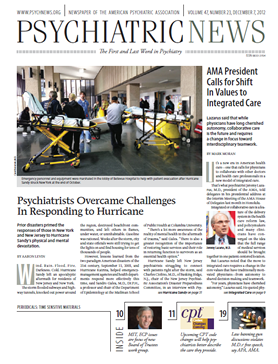The criminal-justice system often has a hard time understanding defendants with Asperger’s syndrome because of the nature of their verbal and psychiatric symptoms, according to Madelon Baranoski, Ph.D., M.S.N., an associate professor of psychiatry at Yale University School of Medicine.
“There is a disparity between their verbal capacity and their practical behavior,” Baranoski said at the annual meeting of the American Academy of Psychiatry and the Law in Montreal in October. “They don’t get idioms or context and this ’odd-yet-normal’ presentation is seen by the court as arrogant and defiant.”
While they are not “intellectually disabled” in the usual sense, their high cognitive abilities are hard to square with their social deficits, said Alexander Westphal, M.D., a fellow in the Department of Law and Forensics at Yale.
Intense but circumscribed interests can get them into trouble, said Westphal, recounting the case of a patient who stole a train, not for material gain but because he was obsessed with transportation.
“However, we know very little about the intersection of autism and forensics,” said Westphal. He searched and came up with just 55 articles on the combined subject—and only 15 were research reports.
“Be careful of case reports, especially if the authors haven’t met the subject,” he cautioned.
Many low-level charges might be resolved at arraignment, Baranoski said, but an obsessive focus on vocabulary coupled with mood lability and a vulnerability to anxiety, depression, and paranoia can often mean trouble if judges, prosecutors, and defense attorneys are unaware of Asperger’s manifestations.
A first step for the forensic psychiatrist in such cases is diagnostic clarity, Baranoski said.
“Psychosis and autism are often confused,” she explained. If the diagnosis is incorrect, and the treatment doesn’t produce the expected response, the clinician may decide the patient is faking. “But in psychosis, the syntax is disturbed,” she pointed out. “When you do neuropsychiatric testing for Asperger’s or autism, what you never see is a disorder in syntax, as you might see in psychosis. If you can parse that out, you can define an entity that has its own trajectory and its own course of treatment.”
If the forensic psychiatrist can induce more understanding by courtroom participants (including the defendant) of the frequent manifestations of Asperger’s and other autism spectrum disorders, it might lead to disposition at lower levels of charges and better outcomes for the patient/defendant, she said.
Once inside the criminal-justice system, though, people with Asperger’s are essentially set up for being misunderstood, said another panelist, Kenneth Weiss, M.D., a clinical associate professor of psychiatry at the University of Pennsylvania.
“Because they have odd mannerisms and speech and are not attuned to others, they become magnets for suspicion,” said Weiss.
They often cannot foresee the consequences of their actions and appear to lack concern for outcomes. To other individuals, they seem to shift quickly from boring to fear-inducing, especially in instances in which they physically push others away in order to preserve their personal space. This can lead to perceived law-breaking in the community but also to victimization, injury, or extended sentences in jail.


